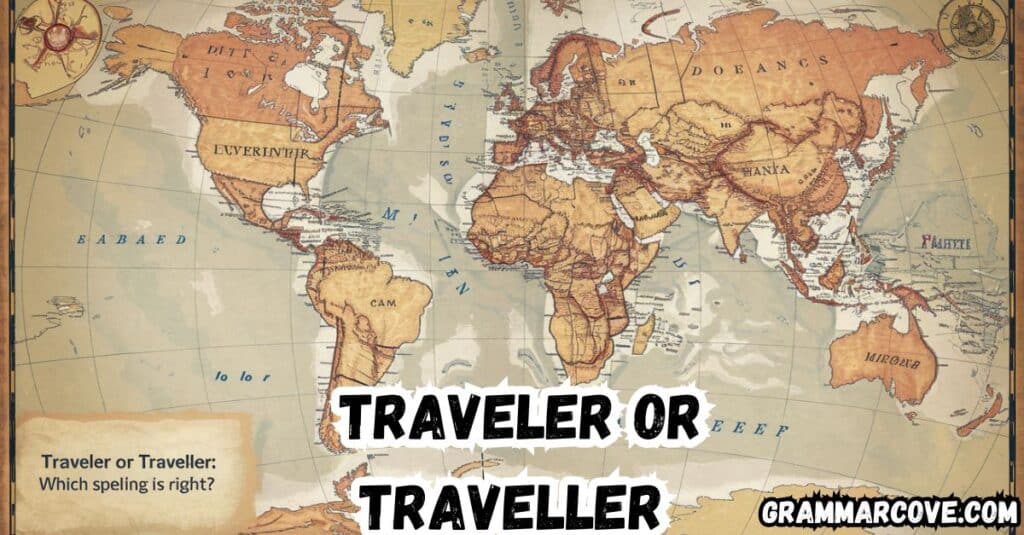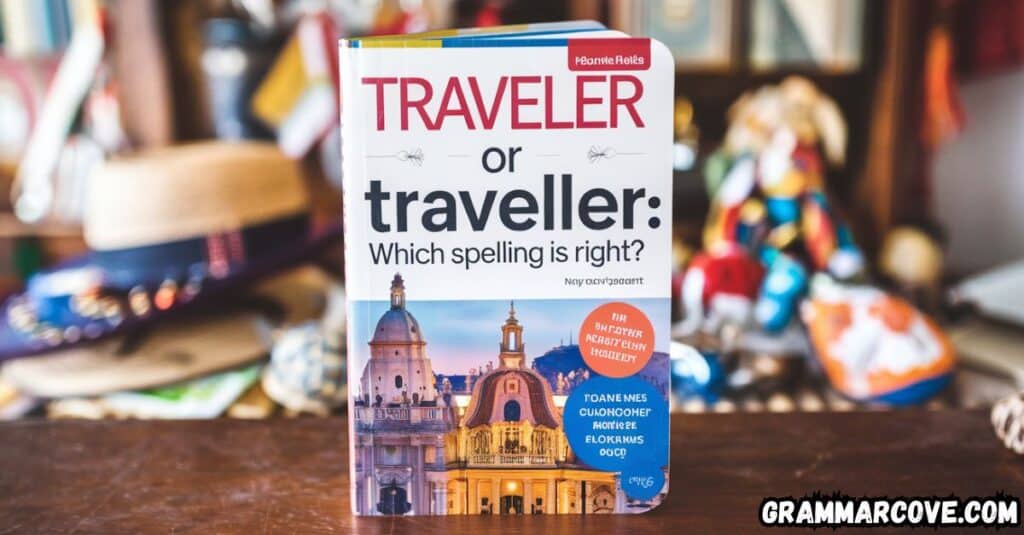When you’re writing about someone who loves to explore the world, you might find yourself faced with the age-old question: traveller or traveler? While both spellings are widely accepted, there’s a subtle difference in usage depending on where you are in the world. If you’ve ever wondered which spelling is correct or when to use each one, you’re not alone.
Let’s dive into this topic and explore the differences, providing examples along the way to help clarify when and how to spell traveler or traveller.
Understanding the Difference: Traveler vs Traveller
The main difference between traveller and traveler comes down to regional spelling preferences.
- Traveller is the British English spelling.
- Traveler is the American English spelling.
If you’re writing for a UK-based audience, traveller is the way to go. However, if you’re catering to an American audience, traveler is the preferred choice. Let’s break down these distinctions further.
British English: Traveller (Two L’s)
In British English, the word “traveller” follows the traditional British convention of doubling consonants before adding certain suffixes. This is why you’ll see the extra “l” in words like “traveller,” “cancelled,” and “travelling.”
For example:
- “I’m a passionate traveller, always seeking new adventures in different countries.”
- “The traveller made sure to pack lightly for his backpacking trip across Europe.”
Scenario Example (Email)
Let’s say you’re corresponding with a British colleague who is asking for travel recommendations. In your response, you would use “traveller.”
Subject: Travel Tips for Your Next Adventure
Dear Sarah,
I’m glad to hear you’re planning a trip to Europe! As a seasoned traveller myself, I have a few tips I’d love to share. First, always carry a universal adapter for your electronics—trust me, you’ll thank me later. Also, pack comfortable shoes because you’ll be walking a lot.
Let me know if you need more suggestions!
Best regards,
John
American English: Traveler (One L)
In American English, the word “traveler” follows the rule of using a single “l” when adding certain suffixes. This is why you see the spelling “traveler” rather than “traveller” in the United States, as well as other words like “counselor” and “traveled.”
For example:
- “Being a traveler has taught me so much about different cultures.”
- “This website is a great resource for travelers looking for new destinations.”
Scenario Example (Email)
Now, imagine you’re corresponding with a U.S.-based friend about their upcoming trip. You’d opt for “traveler” in this case.
Subject: Excited for Your Trip!
Hey Mark,
I know you’re about to head to South America—how exciting! As a seasoned traveler, I’m sure you’re already packed and ready to go. Don’t forget to download offline maps for some of those more remote areas. And remember, always check the local customs before you arrive!
Safe travels,
Emily

Why Does the Spelling Change?
The difference in spelling between traveller and traveler can be traced back to historical language evolution. The main driving force behind these variations is the standardization of English spelling in the 19th century, which was influenced by different dictionaries and linguistic preferences in the United States and the UK.
Noah Webster, the famous American lexicographer, played a major role in simplifying English spelling for Americans. His dictionary aimed to make the language more phonetic and less complicated. This led to changes such as traveler (one “l”), color (instead of “colour”), and theater (instead of “theatre”). In contrast, British English retained the more traditional spellings, like traveller, colour, and theatre.
Is One Spelling ‘More Correct’ Than the Other?
Neither traveller nor traveler is more “correct” than the other. The choice between them depends entirely on the language variety you’re using: British English or American English. Both spellings are equally valid in their respective regions.
If you’re writing for a global audience, it’s a good idea to choose one version and stick to it consistently. This ensures your writing remains clear and professional. For example, if you’re writing a blog post about travel tips that will be read by both British and American audiences, make sure to decide which spelling fits your target demographic best.
How to Spell Traveler: General Tips
If you’ve ever found yourself staring at the word, unsure of which spelling to choose, here are a few tips to guide you:
- For British English: Use traveller (with two L’s).
- For American English: Use traveler (with one L).
- Remember, the rule about adding suffixes applies here. If you’re adding a suffix to “travel” (like in “travelling,” “travelled,” or “travellers”), it’s the same pattern. Double the L in British English and leave it single in American English.
Common Mistakes with Traveler or Traveller
It’s easy to get confused between the two spellings, especially if you’re switching between different English variations. Some common mistakes include:
- Mixing up the spellings in the same document. If you start with one version, make sure to stick to it. Switching between traveller and traveler within the same article can confuse readers.
- Using a non-standard spelling in a professional context. Whether you’re writing an email, a blog post, or a report, consistency is key. If you’re unsure, check your document’s language settings to match the correct version.
When to Use “Traveler” or “Traveller” in Context
Let’s take a closer look at how both spellings fit into different contexts. Below is a comparison table to clarify the spelling usage depending on the region.
| Context | British English (Traveller) | American English (Traveler) |
|---|---|---|
| Travel Blog Post Title | Top 10 Destinations for the Traveller | Top 10 Destinations for the Traveler |
| Email to a British Colleague | “I’m a passionate traveller myself.” | N/A |
| Email to an American Friend | N/A | “As a seasoned traveler, you must have some great stories.” |
| Travel Advertisement | “Great deals for travellers!” | “Great deals for travelers!” |
| Book Title | “The Journey of a Traveller” | “The Journey of a Traveler” |
As shown in the table, regional preferences will influence the choice of spelling, but both versions are interchangeable based on the target audience.
Can Both Spelling Variations be Used in the Same Sentence?
It’s possible, although rare, to use both traveller and traveler in the same sentence when writing for an audience that includes both American and British readers. Here’s an example:
Example: “As a traveller, I’ve learned a lot about different cultures. Being a traveler, you get to experience the world in a unique way.”
However, this should be done sparingly to avoid confusing the reader. It’s more common to choose one version and stick to it throughout the text.
Frequently Asked Questions
How do I know if I should use traveller or traveler?
Simply put, the choice comes down to which version of English you are using. In the UK and many other countries that follow British English, traveller is the preferred spelling. In the U.S. and countries using American English, traveler is the correct choice.
Is it incorrect to use traveller in American English?
It’s not incorrect per se, but it’s highly unconventional. Americans will expect the spelling traveler, and using the British version may confuse some readers. If you’re writing for an American audience, it’s best to stick to traveler.
Can I use both traveller and traveler in the same document?
You can, but it’s advisable to choose one version and remain consistent throughout your document. Mixing the two can create confusion, especially if your audience is diverse.
Conclusion
In the battle of traveller vs traveler, there’s no clear winner. Both spellings are correct—just used in different parts of the world. The key is to know your audience and choose the spelling that matches your location or intended readership.
Remember, whether you prefer traveller or traveler, the most important thing is consistency. If you’re writing for a British audience, go for traveller; for an American audience, use traveler. Stick to one version, and your writing will be as smooth as your next adventure.


